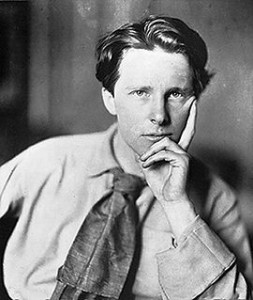
Brooke was connected to the Bloomsbury Group (Lytton Strachey and Virginia Woolf, among others) as well as several poetry groups in pre-war Britain. After suffering some kind of emotional collapse, he traveled to the United States and Canada, writing travel articles for the Westminster Gazette, and then returned home via the South Seas, where it was rumored he fathered a child with a Tahitian woman. Back in Britain, he was introduced to Winston Churchill, First Lord of the Admiralty, and joined the Royal Navy. It was while his ship was on its way to what became the Battle of Gallipoli that he contracted sepsis.
He wrote some beautiful poems over approximately a 10-year period before his death. Here are two of them.
The Way That Lovers Use
The way that lovers use is this;
They bow, catch hands, with never a word,
And their lips meet, and they do kiss,
— So I have heard.
They queerly find some healing so,
And strange attainment in the touch;
There is a secret lovers know,
— I have read as much.
And theirs no longer joy nor smart,
Changing or ending, night or day;
But mouth to mouth, and heart on heart,
— So lovers say.
Beauty and Beauty
When Beauty and Beauty meet
All naked, fair to fair,
The earth is crying-sweet,
And scattering-bright the air,
Eddying, dizzying, closing round,
With soft and drunken laughter;
Veiling all that may befall
After — after —
Where Beauty and Beauty met,
Earth’s still a-tremble there,
And winds are scented yet,
And memory-soft the air,
Bosoming, folding glints of light,
And shreds of shadowy laughter;
Not the tears that fill the years
After — after —
Poetry News and Postings:
The Seattle Times is celebrating National Poetry Month with a Twitter poetry contest. (Thanks, Maureen Doallas, for the tip!)
Poetry on the Move – Laura Boggess at The Wellspring – includes her poem “Uncommon Currency.”
L.L. Barkat checks out some advice on how to write a poem.
Just a sentence and some words – the Random Act of Poetry at The High Calling Blogs.
The Poem A Day from the Academy of American Poets yesterday was Derek Wolcott’s “In the Village” from White Egrets. Wolcott won the Nobel Prize for Literature in 1992.
And check out Susanne Barrett’s “April Fool’s Day” in the comment section of the previous post here. We’ll directly to her original post as soon as her new blog site is up.
- Poets and Poems: Christina Cook and “Roaming the Labyrinth” - April 22, 2025
- Longfellow’s “Paul Revere’s Ride”: Creating a National Legend - April 17, 2025
- Poets and Poems: Katie Kalisz and “Flu Season” - April 15, 2025
Maureen Doallas says
How nice to find here a poet we don’t often encounter anymore. You chose so well from among his words.
L. L. Barkat says
Shoot, the Twitter link isn’t working 🙂
I love how you are taking me to old and new places with these entries. I willingly go…
Maureen Doallas says
Patti Digh (http://pattidigh.com/) is featuring marvelous poetry on her blog. She offers a particularly powerful poem today.
n davis rosback says
These two poems by R. Brooke are simply beautiful.
I have been having a good time posting poems and poem related things on the Cunning Poets Society page on Facebook. Mosttly poems from blogs that I am already familiar with. Also, some of the group members have been posting their poems, which is wonderful to me. Today I was plesantly surprised with a poem post there from the Camel, Bradley J. Moore. called “A Message”.
http://bit.ly/crn9y8
laura says
Rupert looks like a redhead, obvious even in this black and white. I have a weakness for redheads 🙂 His words don’t disappoint.
Thanks for the plug, Glynn. Just a note…the title of my poem is “Uncommon Currency”. No biggie, but central to it’s meaning.
You are bringing some wonderful works our way this poetry month! Thanks for that!
Glynn says
Laura – It’s fixed. That’s what happens when you’re posting articles at 3 in the morning.